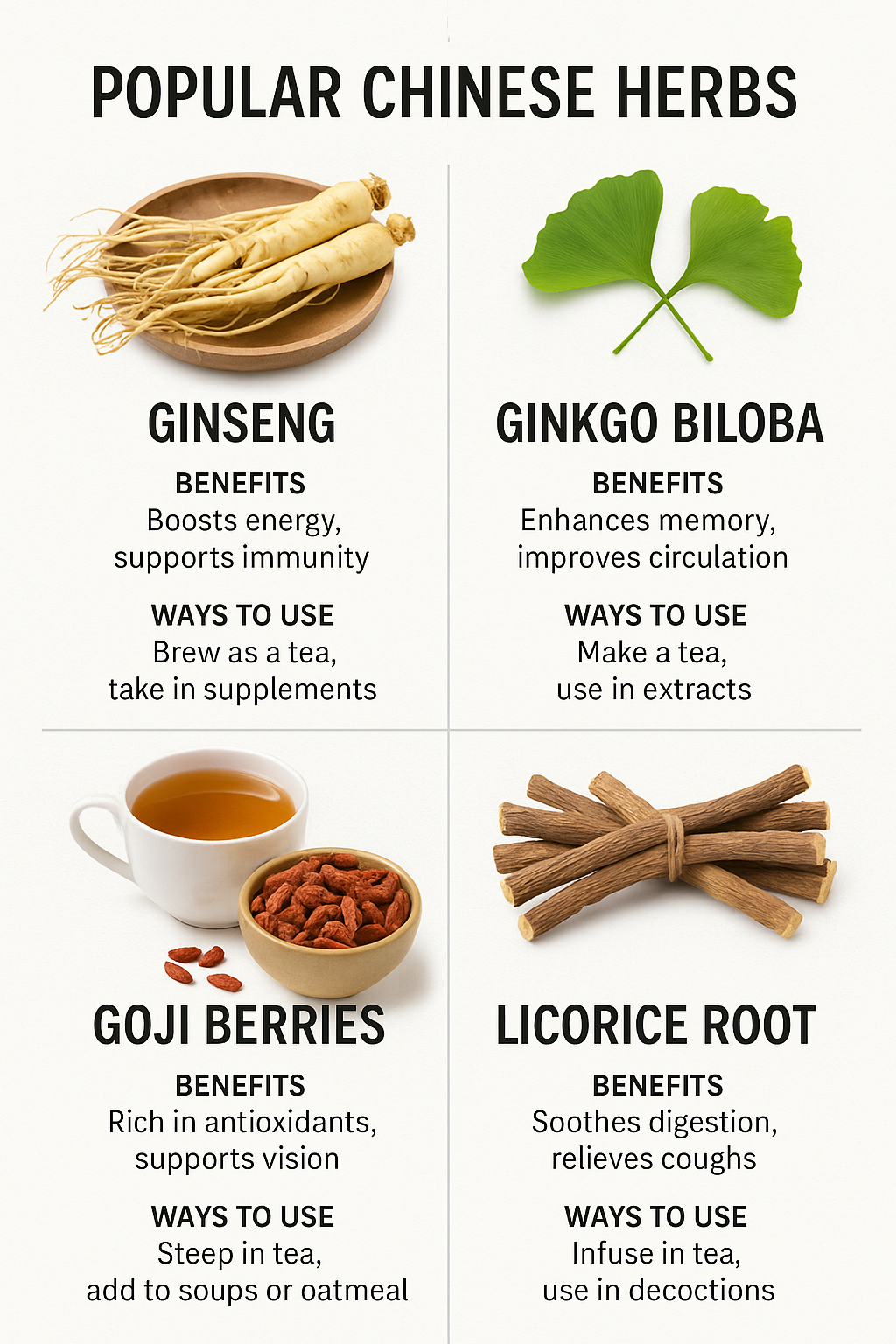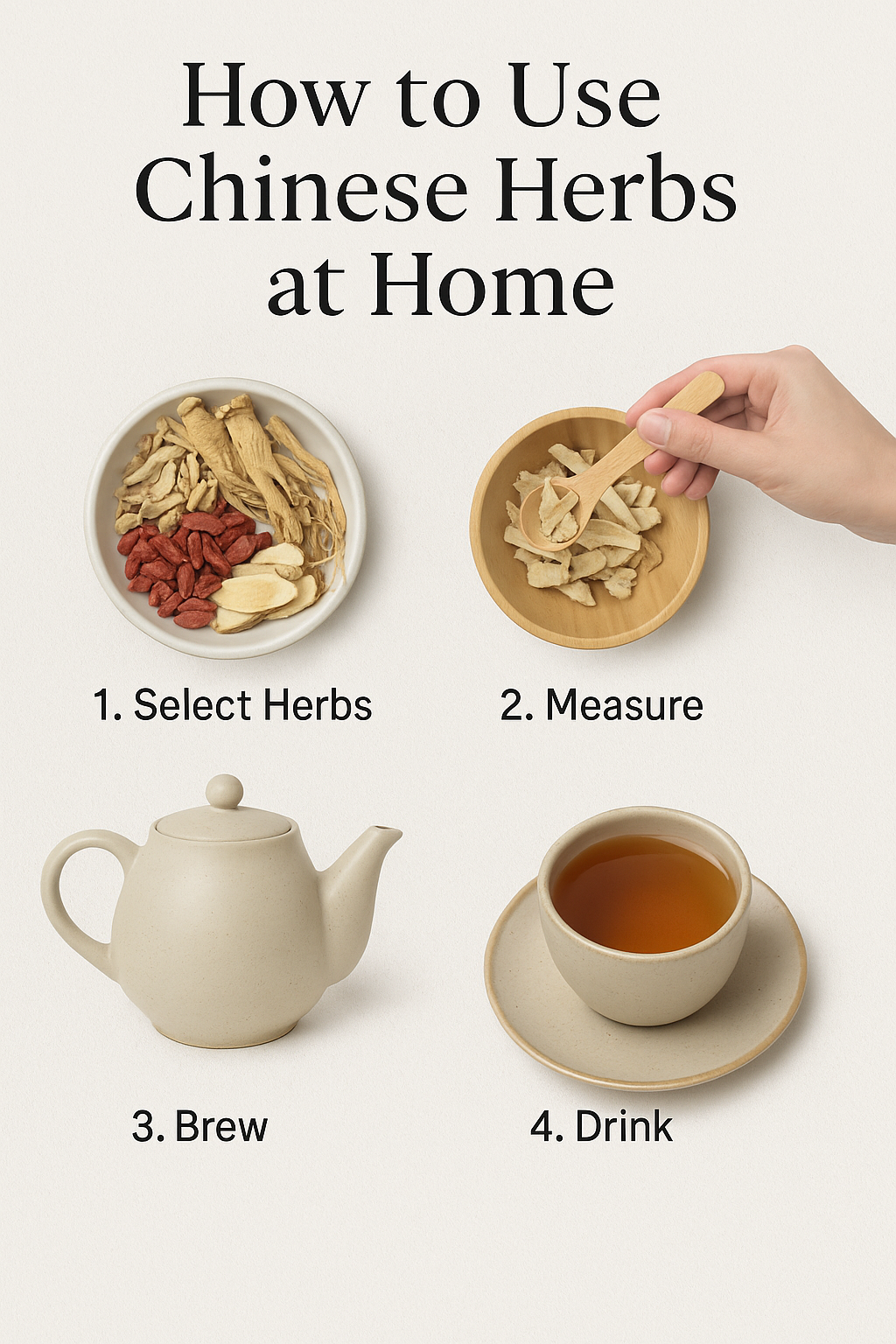Chinese Herbs: The Complete Guide to Healing Traditions & Everyday Wellness
What Are Chinese Herbs? (Quick Answer)
Chinese herbs are the backbone of Traditional Chinese Medicine (TCM), a system practiced for over 2,500 years. They’re not just “remedies” — they’re tools for restoring balance, resilience, and harmony in the body.
 In contrast to many Western herbs that are typically employed in isolation for their specific therapeutic benefits, Chinese herbs are predominantly utilized in carefully crafted formulas. This unique approach allows individual herbs to work synergistically, enhancing each other's effects while minimizing potential side effects. This method reflects a profound understanding of herbal medicine cultivated over thousands of years, emphasizing balance and holistic well-being.
In contrast to many Western herbs that are typically employed in isolation for their specific therapeutic benefits, Chinese herbs are predominantly utilized in carefully crafted formulas. This unique approach allows individual herbs to work synergistically, enhancing each other's effects while minimizing potential side effects. This method reflects a profound understanding of herbal medicine cultivated over thousands of years, emphasizing balance and holistic well-being.
Today, Chinese herbs have gained widespread recognition and usage around the globe, with millions of individuals incorporating them into their health regimens. These powerful herbal combinations are often sought for their ability to support vital aspects of health, including boosting energy levels, enhancing digestive function, strengthening the immune system, stabilizing emotional well-being, and promoting restful sleep.
The adaptability and efficacy of Chinese herbal formulations make them an integral part of modern wellness practices, seamlessly merging ancient traditions with contemporary health needs. This comprehensive approach to herbal medicine not only addresses specific symptoms but also fosters overall balance and vitality within the body, underscoring the enduring significance of Chinese herbs in promoting holistic health.
Why Chinese Herbs Still Matter Today
Consumers want natural, safe, and time-tested ways to support health. Chinese herbs answer that need by:
-
Supporting Digestion — Herbs like Shan Zha (Hawthorn Berry) and Chen Pi (Aged Tangerine Peel) are traditionally used to ease bloating and aid digestion.
-
Boosting Energy & Vitality — Adaptogenic herbs like Huang Qi (Astragalus) and Ren Shen (Ginseng) are prized for maintaining stamina.
-
Balancing Stress & Sleep — Herbs such as Suan Zao Ren (Jujube Seed) have long been used in calming formulas.
-
Immune Wellness — Ban Lan Gen (Isatis Root) and Jin Yin Hua (Honeysuckle) are seasonally prepared to help the body adapt during times of stress.
Key Point: Chinese herbs aren’t about “quick fixes.” They’re about building resilience over time so your body can restore balance naturally.
A Tradition Backed by History & Science
-
Historical Roots: Documented in the Shen Nong Ben Cao Jing (The Divine Farmer’s Classic) over 2,000 years ago.
-
Modern Research: Many Chinese herbs are studied in PubMed-indexed journals, with clinical research exploring their bioactive compounds.
-
Global Recognition: The World Health Organization acknowledges TCM as a valuable system of health, and demand for herbs is rising worldwide.
By combining ancient wisdom with modern quality standards like Good Manufacturing Practices (GMP) and third-party testing, Chinese herbs have never been more accessible or trusted.
 How to Use Chinese Herbs at Home
How to Use Chinese Herbs at Home
One reason Chinese herbs stay relevant is their versatility. Here are the main methods:
-
Teas & Decoctions (Classic Method): Herbs simmered in water, the way TCM practitioners have prescribed for centuries. Example: Ban Lan Gen tea.
-
Powders & Extracts (Modern Convenience): Easy to stir into smoothies, juices, or teas. Example: concentrated extracts of Reishi or Cordyceps.
-
Capsules & Teapills (Daily Routine Friendly): Pre-measured and portable. Example: Gan Mai Da Zao Wan for calming support.
-
Tinctures (Fast Absorption): Alcohol or glycerin-based extracts for on-the-go support.
Learn more here: How to Use Bulk Herbs »
Top 10 Chinese Herbs You Should Know
Here are the most searched and trusted herbs in Chinese medicine today:
-
Astragalus (Huang Qi): Traditionally used for energy and immune support.
-
Ginseng (Ren Shen): Known worldwide for stamina and vitality.
-
Licorice Root (Gan Cao): A harmonizing herb found in countless formulas.
-
Reishi Mushroom (Ling Zhi): The “mushroom of immortality,” revered for balance.
-
Goji Berries (Gou Qi Zi): A tonic berry rich in tradition and nutrients.
-
Hawthorn Berry (Shan Zha): Used to support healthy digestion.
-
Scutellaria (Huang Qin): A cooling herb found in classic formulas.
-
Isatis Root (Ban Lan Gen): Traditionally brewed during seasonal changes.
-
Jujube Seed (Suan Zao Ren): Used for calming and sleep support.
-
Bupleurum Root (Chai Hu): A balancing herb often used for stress-related patterns.
Explore our Bulk Chinese Herbs Collection »
Frequently Asked Questions About Chinese Herbs
Are Chinese herbs safe?
Yes, when purchased from reputable sources that follow GMP-certified practices and perform safety testing. Avoid unknown brands with no transparency.
What’s the difference between Chinese and Western herbs?
Western herbs are often used singly. Chinese herbs are usually blended into formulas, designed to balance each other and target the root cause of imbalance.
Can I take Chinese herbs every day?
Yes, many tonic herbs (like Astragalus and Goji Berries) are consumed daily, while stronger herbs are taken short-term. Always follow dosage guidelines.
What are the most popular Chinese herbs?
Astragalus, Ginseng, Reishi, Licorice Root, Goji Berries, and Hawthorn consistently rank among the top searched worldwide.
Why Shop With Us
At 1st Chinese Herbs, we provide more than products — we provide trust, transparency, and expertise.
-
Over 400 Chinese and Western herbs available in bulk, powders, tinctures, and teapills.
-
GMP-certified, third-party tested herbs for quality and safety.
-
Educational resources so you can choose herbs with confidence.
-
U.S.-based, family-owned, with 20+ years of herbal experience.
-
Energy and Vitality:
- Ginseng: A study titled "Ginseng and ginseng products: the effects on human health" discusses how ginseng can help enhance physical performance and improve energy levels. Link to PubMed
-
Digestive Support:
- Hawthorn: The article "A review of the effectiveness of hawthorn extract for the treatment of chronic heart failure" mentions hawthorn's traditional use in aiding digestion and related functions. Link to PubMed
-
Immune Strength:
- Astragalus: The clinical study "Astragalus membranaceus (Huang Qi): A literature review of the herb's immune properties" provides evidence of how astragalus supports immune function by enhancing T-cell activity and other immune responses. Link to PubMed
-
Stress Balance:
- Suan Zao Ren (Jujube Seed): A study titled "Suan Zao Ren (Ziziphus jujuba) for insomnia: A systematic review" highlights its use in traditional medicine for alleviating stress and promoting relaxation, showing its effectiveness in dealing with sleep issues and anxiety. Link to PubMed
-
Sleep Support:
- Reishi Mushroom: The article "Reishi mushroom (Ganoderma lucidum) improves sleep quality in patients with insomnia: A systematic review" discusses the effects of Reishi on improving sleep patterns and overall sleep quality. Link to PubMed
Trust & Transparency
Author Bio:
Sarah Johnson, MS in Holistic Healing, is a recognized herbal educator and owner of 1st Chinese Herbs. With more than two decades of expertise in Traditional Chinese Medicine, her mission is to make trusted, high-quality herbs accessible while educating consumers for safe and effective use.
Related Links

